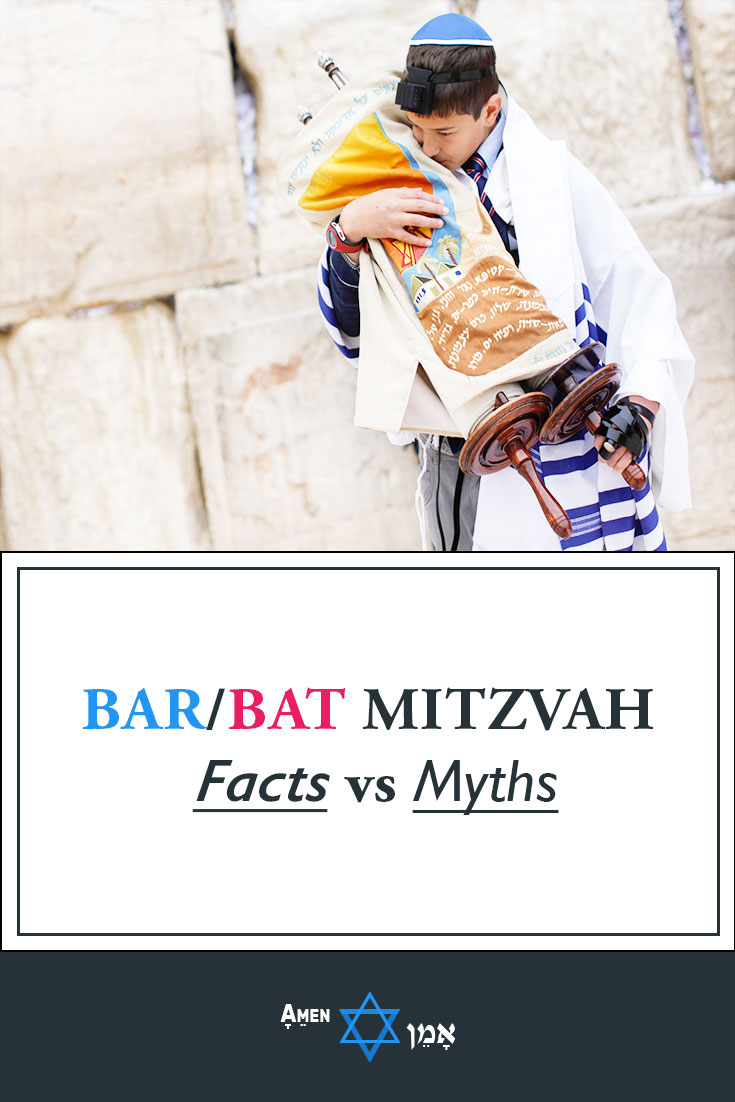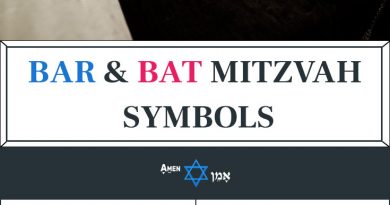Bar/Bat Mitzvah Facts vs Myths: Find Out Once & For All…
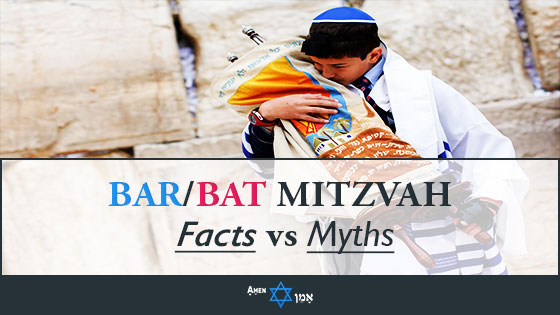
There are TONS of misconceptions out there about the Jewish Bar/Bat Mitzvah ceremony.
Question is – how do you separate the Bar/Bar Mitzvah facts from absolute myths?
Answer: You read this article 🙂
Grab a pin, we’re about to bust a few myths…
Table of Contents
Bar/Bat Mitzvah Traditions & Customs
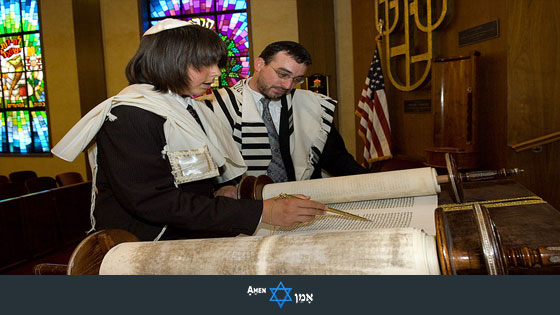
For someone attending a Bar Mitzvah ceremony for the first time, many of the Bar/Bat Mitzvah customs & rituals may seem odd:
Why do you perform these rituals? Are you even required to follow them? What should you do?
And what’s the whole purpose of this ceremony to begin with?
Myth: Bar Mitzvah is the name of the event
Nope…
The term Bar (or Bat) Mitzvah is actually made of 2 Hebrew words:
- Bar(בַּר) = Son
- Mitzvah(מִצְוָה) = Commandment (or laws)
“Son of commandment”? Doesn’t make a lot of sense, does it?
Not unless you dig deeper… That’s where the whole “Torah has seventy layers of depth” (Shiv’m Panim LaTorah) thing kicks in, so let’s break that down further.
In rabbinical usage, the word “Bar” has another meaning: “subject to”. Add that with “commandments”, and you get “subject to commandments”.
Makes more sense now, right?
In other words – the term “Bar Mitzvah” simply means a Jewish boy who is now subject to the Torah’s commandments (Mitzvot), even though nowadays people mostly use the term to describe the event itself.
The same logic applies to “Bat Mitzvah”, just for girls.
Fact: The Jewish coming of age is 13 for boys and 12 for girls
That’s around the same time they hit puberty (i.e physical maturity) … coincidence?
Note: With the exception of reform Jews, who also celebrate their Bat Mitzvah at age 13.
Myth: A Bar Mitzvah MUST read a Torah portion
This is one of the biggest misconceptions in Jewish tradition that causes most people to raise their eyebrows when they find out for the first time.
Technically speaking – there’s no strict requirement to have a Bar Mitzvah ceremony at all.
Like I mentioned earlier – the term “Bar Mitzvah” translates to “subject to commandments”, which means that when a Jewish boy reaches his coming of age, he’s now required to follow the Torah’s commandments.
The Aliyah is just a symbolic way to celebrate a Bar Mitzvah’s coming of age, but it’s NOT technically required by Jewish law.
Fact: The Bar Mitzvah takes Torah lessons with a Rabbi to practice his Torah reading
The Bar Mitzvah studies with a Rabbi for a few months to prepare for his Torah reading.
Note: These days, more and more boys and their parents decide to study with a Rabbi online.
Myth: The Bar Mitzvah wears a Kippah, Tefillin and Tallit on his Bar Mitzvah ceremony
This is a tricky one.
Let’s start with the Kippah (or yarmulke).
Jewish men have to wear a Kippah when they pray, or when they’re inside a place of worship (synagogues).
How about Tefillin?
Every Jewish man above the age of 13 is required to put on Tefillin for the 6 other days of the week, EXCEPT Shabbat. That includes our birthday boy.
Although not required, many Jewish kids start wearing Tefillin a month or two before their Bar Mitzvah ceremony to get used to it. After all – if the Jewish boy is planning to wear Tefillin for his entire adult life – it would be a good idea to start practicing in advance.
Ironically though – the Bar Mitzvah usually doesn’t wear Tefillin on his Bar Mitzvah ceremony.
Most Bar Mitzvah ceremonies are held on Shabbat… And Tefillin isn’t allowed on Shabbat! (FYI – they’re not allowed on most Jewish holidays either)
If the ceremony is held on a Monday or a Tuesday (the other days we read from the Torah) – then Tefillin is allowed and they’ll wear it on during their Aliyah.
As for the Tallit – it varies by community. In Sephardic communities, boys wear a Tallit starting from their Bar Mitzvah (at the age of 13), while in Ashkenazi communities – men wear a Tallit only after they get married.
In conservative and reform communities, Bat Mitzvah girls wear a Tallit too.
Note: Obviously, some Jews decide to wear a Kippah at all times. But that’s technically not required.
Worth Mentioning: Actually, there’s a whole debate about whether it is required (Mitzvah) or simply a custom (Minhag). But let’s keep it simple…
Fact: A Bar/Bat Mitzvah HAS TO celebrate their coming of age
Well, this is odd… The Torah reading isn’t mandatory, but the celebration is?!
Surprising, isn’t it?
That’s precisely the difference between custom (Minhag) and law (Halacha).
But here’s the thing: A celebration doesn’t mean spending a fortune on the best Bar/Bat Mitzvah party in town with Drake as your guest singer.
Traditionally, it meant inviting your friends, family, and community to a small meal after the ceremony.
These days, it looks much more like the former.
Myth: Every Bar/Bat Mitzvah HAS TO celebrate their Bar Mitzvah in Israel (the Jewish holy land)
Do they HAVE to? No.
But many of them do celebrate their Bar/Bat Mitzvah in Israel (or at least try to convince their parents).
They visit the Western Wall, take a trip to Masada, and if they’re lucky – they might even catch a tan in Eilat, float the Dead Sea or go walk on water on the Sea of Galilee (OK, they probably don’t walk on water, but you know what I mean).
Myth: Adults who haven’t celebrated their Bar/Bat Mitzvah at their coming of age, have missed the train, and can’t celebrate it anymore
Not true. Any Jewish person above the age of 13 (for boys) or 12 (for girls) is considered a Bar/Bat Mitzvah, regardless if they had a Bar/Bat Mitzvah ceremony.
The celebration is exactly that – a celebration… it’s not an obligation.
If you missed out on your Bar/Bat Mitzvah celebration – you can have a belated Bar/Bat Mitzvah celebration… that’s completely “Kosher”.
Take Jewish converts or adults for example… They often couldn’t celebrate their Bar/Bat Mitzvah ceremony when they were 12 or 13 years old for whatever reason. So they often celebrate their Bar/Bat Mitzvah later in life.
Myth: The Bar/Bar Mitzvah’s coming of age means they’re ready to get married
Oy vey! Hell no!
Back to school, kids!
Fact: It’s customary for the Bar/Bat Mitzvah to give a speech
Usually, both the Bar/Bat Mitzvah and the parents give a speech (sometimes the drunk uncle too).
You know, the traditional shtick:
- “Thank you for coming…”
- I’m so grateful… “
- “I’d like to thank aunt Bracha for coming all the way from Mars…
Yes, some boys & girls are incredibly shy and will try anything in their power NOT to give a speech.
Sure, public speaking is the #1 fear in the world (even more than death).
But hey – they reached their coming of age. So c’mon kids, time to grow up and face your fears (thankfully, I wrote a guide that makes writing a Bar/Bat Mitzvah speech a walk in the park, so no worries!).
Fact: During their speech – the Bar/Bat Mitzvah announces a special Mitzvah they’re focusing on
It’s called the Mitzvah project.
The Bar/Bat Mitzvah chooses one Mitzvah to focus on and become an expert at it. They usually announce their Mitzvah project in their Bar/Bat Mitzvah speech.
Note: This invites peer pressure and accountability to fulfill the Mitzvah
Myth: Jewish men & women share the same commandments
While men & women share many of the same commandments, women are exempt from some of the male’s commandments.
They also carry 3 extra commandments that are exclusive to women:
- Lighting Shabbat & holiday candles
- Kneading Challah
- Niddah
Fact: A common Bar Mitzvah custom is to throw candy at the Bar/Mitzvah during the Bar Mitzvah service
Yes, you heard that right.
The meaning of this (weird” tradition is to wish the young Bar Mitzvah a sweet life.
After the candy shower ends, you call the cleaning lady little kids to pick up the mess.
That keeps the kids busy for the rest of the ceremony. You know, kids aren’t famous for their ability to sit on their “tuches” for a few hours straight.
Just don’t forget to say the “Shehakol” blessing before you munch on the candy.
Personal Anecdote: Imagine being bombarded with candy on your head, especially when the women sitting upstairs have a wide-open angle. I should know, I got “hit” with a candy in my eye on my Bar Mitzvah… you call that a sweet life?!
Myth: The Bar Mitzvah is circumcised on his Bar Mitzvah
Oy gevald! Goodness no!
Could you imagine if that were the case?! (Oh, the horror!)
A Bar Mitzvah has nothing to do with Brit Milah…
Bar/Bat Mitzvah Etiquette & Attire
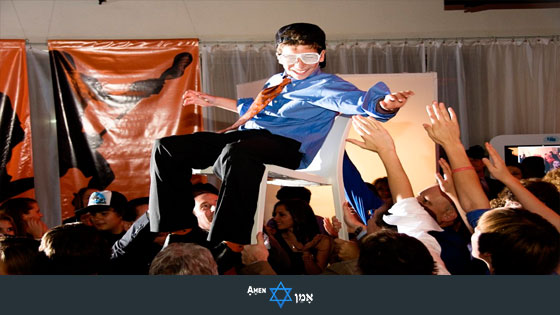
How should you behave at the ceremony?
What should you wear?
What should you say?
What exactly happens in those Bar/Bat Mitzvah parties, anyway?
Lots of questions… how about some answers?
Fact: The most appropriate Bar Mitzvah blessing in Hebrew is “Mazel Tov”
“Mazel Tov” is the Jewish version for “congratulations”.
Fact: You should dress modestly to the Bar/Bat Mitzvah ceremony
This is a formal event, often in a religious place… Tznius people!
The Bar/Bat Mitzvah attire depends on the type of venue:
- For the Bar Mitzvah service in the synagogue – wear a semi-formal, respectful and modest dress.
- If it’s a full-on Bar/Bat Mitzvah party – then a formal dress is the way to go.
It all depends on the type of event: For example, if you’re attending an Orthodox Bar/Bat Mitzvah ceremony – wear longer and more modest dresses (no cleavage!).
Myth: You Should send/receive the Bar/Bat Mitzvah invitations via WhatsApp
No, no, no… please don’t do that! The whole point of a Bar/Bat Mitzvah invitation is to make it personal and match it to the Bar/Bat Mitzvah theme.
What’s personal about mass sending an invitation that took you two seconds to set up and hit “send”?
Bottom line – If you’re planning a Bar/Bat Mitzvah – please send appropriate Bar & Bat Mitzvah invitations.
Myth: You can’t wear black to a Bar/Bat Mitzvah
Nonsense.
I get where that question is coming from: “A Bar/Bat Mitzvah is a happy event, and black is associated with grief. Isn’t that inappropriate?
The short answer is no. Not only is appropriate, it’s actually a very good idea.
Your Bar/Bat Mitzvah attire should be formal, modest and respectful.
Black is a modest and respectful color in Judaism. It represents maturity, which is why many Bar Mitzvah boys wear their first dark (read: black) suit on their big day.
Note: Besides, if you wear black – your clothes won’t scream “Look at me! Look at me!”. If you attract attention – the Bar Mitzvah won’t like it (no cake for you!).
Look at Orthodox Jews… care to guess what they wear on a Bar/Bat Mitzvah?
Fact: The Bar Mitzvah service lasts for at least 2 hours
Yep… sometimes even longer.
The Bar Mitzvah service usually takes place on the Shabbat morning service at the synagogue, which lasts for a couple of hours:
- First, you have the Shabbat morning prayers (including the Shema prayers, Amidah etc’)
- Second, you have the Torah reading – the Bar Mitzvah’s big moment where he reads that week’s Parsha and chants the Haftarah.
- Then, you have Musaf
Finally – you have the Seudat Mitzvah (food!)
In other words – you’ll have to sit for a few hours without your mobile phone… Scary thought, isn’t it?
Fact: There’s a special Bar/Bat Mitzvah dance involving a chair.
True story. It’s called the “Hora” dance.
And let me tell you… it’s scary up there when your drunk friends throw you in the air like a pancake.
Myth: There’s a special Bar/Bat Mitzvah dance involving a table
If there’s a chair dance, then why not a table dance?
OK, that’s pushing it… NO tables, please!
Luckily, I just made this (myth) up 🙂
Bar/Bat Mitzvah Gifts
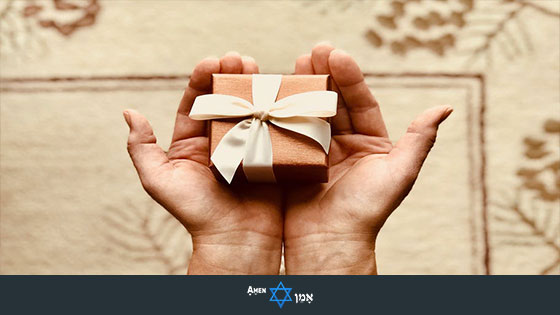
What gift should you get the Bar/Bat Mitzvah? Should you even bring a gift?
Should you bring money? If so, how much?
Myth: The most appropriate Bar Mitzvah gift is money
Bar Mitzvah gift or money?
This is a highly debatable topic…
The truth is – it varies considerably between different countries and cultures. Here’s the common gift etiquette in various countries:
- In the US – mostly gifts (although money is also considered OK in most cases)
- In European countries – gifts.
- In Israel – money, and only money!
Note: In Israel – it’s almost considered rude NOT to give money. Keep that in mind if you ever attend a Bar/Bat Mitzvah in Israel.
Fact: It’s a common Jewish tradition to give money in multiples of $18
The number 18 in Judaism means “Chai” (חי) or “life”. When you give the Bar/Bat Mitzvah money in multiples of $18, you’re wishing them a long and successful life.
Fact: You should give your guests party souvenirs
If you’re having a Bar/Bat Mitzvah party – it’s common to give away Bar/Bat Mitzvah favors to your guests.
This is especially true if you’re having a big Bar/Bat Mitzvah party in an event hall.
Conclusion
Fact or myth? You just found out a bunch of interesting Bar Mitzvah facts you didn’t know about.
Tell me in the comments!
P.S – Send this article to your friends who are about to attend a Bar/Bat Mitzvah ceremony. I bet they could use it.
